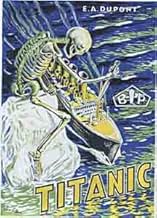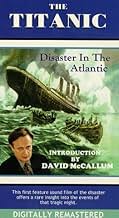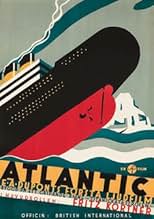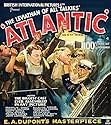अपनी भाषा में प्लॉट जोड़ेंOn its maiden voyage in April 1912, the supposedly unsinkable RMS Titanic hits an iceberg in the Atlantic Ocean.On its maiden voyage in April 1912, the supposedly unsinkable RMS Titanic hits an iceberg in the Atlantic Ocean.On its maiden voyage in April 1912, the supposedly unsinkable RMS Titanic hits an iceberg in the Atlantic Ocean.
- निर्देशक
- लेखक
- स्टार
Gordon James
- Capt. Collins
- (as Sydney Lynn)
फ़ीचर्ड समीक्षाएं
How interesting that E.A. Dupont who created one of germany's most memorable silent films (VARIETY) also helmed one of England's first talkies. Obviously he was uneasy with the medium of talking pictures, note how the first 6 minutes of this film is entirely visual. Most of the cast had stage experience, you can tell because they over-exaggerate their lines and cannon out the words like they were playing to the back row. Still this is a well paced dramatic film and the final few minutes have an impact that can stand on their own alongside the later versions, TITANIC and A NIGHT TO REMEMBER. (I am deliberately excluding James Cameron's film with its budget that would have fed a 3rd World country for 10 years and its plethora of computer FX.)
let me firstly say that too many of these reviewers ,particularly the film student,are viewing the film in a modern context and not as a film made at the coming of sound.In an interview given by John Longden for the BBCs programme "Yesterdays witness" he stated that the ridiculously long pauses between dialogue were entirely the idea of the director.So it is unfair to blame the actors for this.Also in that same programme sound men were interviewed.They said that the effects were recorded on a liner berthed at Tilbury.The ship was linked by phone line to Elstree studios.Before each effect someone would come on the line to describe the effect and it would be recorded at Elstree.The problems with early sound films were quite apparent here.few directors here or in America had the skill of Hitchcock in adapting to the new medium.In fact one should praise the attempt to tell the story in what was then effectively a new medium rather than decry the effort some 84 years later because it is old fashioned.no doubt in the year 2097 young film students will be looking at the like of Man of Steel and chuckling at its antique quaintness.
I purchased this film on DVD to add to my collection of Madeleine Carroll films, and although the stunningly beautiful actress does not have a tremendous amount of screen time, I was not disappointed in the final product. I've never particularly cared for disaster films, and the Cameron blockbuster of a few years ago left me decidedly cold, as it were. Not being an expert on the events surrounding the sinking, I was still quite sure that this mega-hit had little relation to what actually transpired on that fateful night. In any event, I am convinced that the film under review is of greater historical accuracy, and unlike the other reviewers, I am not particularly discouraged to discover that a film made almost 80 years ago is not quite as "spiffy" as more recent products. At the very least, films of this type should be regarded as valuable documents of the ways things were done in the not too distant past, and when you realize that "Atlantic" was made a mere 17 years after the Titanic went down, that is all the more reason to cherish it as an invaluable time capsule of a significant event in the annals of the 20th century that still apparently fascinates a great many people.
As far as the individual performances are concerned, I thought that the players effectively conveyed the starkness of the dilemma the doomed passengers were facing, especially the futility of those remaining men who had hope no hope of salvation, the end being only a matter time. Of particular note was the abrupt contrast between the gay frivolity that permeated the mood immediately before the bad news was conveyed by Lanchester and what immediately followed. Add to that Monica's frantic separation from her husband, as she was literally dragged on to the hanging lifeboat, was quite poignant, made all the more so when the news that she was pregnant became known later.
For those interested in a well made vintage film that provides a fascinating look at a sensational event with which practically everyone alive has at least some inkling of, I highly recommend this film. (And there's the added bonus of a very young Madeleine Carroll to feast your eyes on).
As far as the individual performances are concerned, I thought that the players effectively conveyed the starkness of the dilemma the doomed passengers were facing, especially the futility of those remaining men who had hope no hope of salvation, the end being only a matter time. Of particular note was the abrupt contrast between the gay frivolity that permeated the mood immediately before the bad news was conveyed by Lanchester and what immediately followed. Add to that Monica's frantic separation from her husband, as she was literally dragged on to the hanging lifeboat, was quite poignant, made all the more so when the news that she was pregnant became known later.
For those interested in a well made vintage film that provides a fascinating look at a sensational event with which practically everyone alive has at least some inkling of, I highly recommend this film. (And there's the added bonus of a very young Madeleine Carroll to feast your eyes on).
No movie with Madeleine Carroll in its cast could possibly be unwatchable. That said, I have to add that this British film comes close. The story takes place on board the `SS Atlantic' and it's loosely based on the `Titanic's' unfinished voyage. The word `unsinkable' is spoken, the liner strikes an iceberg, and we hear a heavenly choir sing `Nearer My God to Thee.' The doomed passengers eventually take over the anthem, in a clever bit of sound work. But the year of the film's release (1929) means that a modern viewer has to accept otherwise primitive sound and many of the acting conventions of silent films and the stage. These aren't problems. The film's major flaw is pacing, and pacing had been well developed in silents. However, if the dialog were delivered at a realistic speed, the movie's running time would be cut in half. The intended effect was drama (and clarity in a new medium), but the result unhappily is tiresome now. The film's structure is preposterously illogical and inept. Paradoxically, I found certain details of the editing quite modern in technique: fine, abrupt cuts from one area of the ship to another, sometimes even on sound effects. Although we're on board the `Atlantic' from the first shot, we were well over 4 minutes into the movie before I discovered that fact. There are long, intrusive musical passages by the ship's dance orchestra. (Entertaining, easy sound.) Personal stories are presented in an utterly uninvolving and unconvincing way. Don't even think of spectacle. The berg is a tiny thing and the exterior damage it does to the ship's hull is a minor dent. However, the scenes of passengers swarming into the lifeboats - clearly staged on a real liner, presumably tied up to a dock - generate great excitement. Other than the glorious Miss Carroll, these sequences are the film's only points of excellence. As the movie and the ship near their end, the screen goes totally black several times when the power generators begin to fail. Their last, eternal blackout is the end of the film, with a sunset/sunrise tacked on, a clumsy symbolic effect. `Atlantic' is a cinema curiosity. At best.
True this movie is creaky by today's standards. It's a British maritime story & British production directed by a German Expressionists director who himself was getting acquainted with sound at the time. I had waited a long time to see this film in it's entirety when I found a video two-tape copy in a Sam Goodys. Before I had only seen clips of this in Titanic documentaries. If the Producers changed the Title from Titanic to Atlantic it was more in conjunction with the movie being made only 17 years after the real disaster. Many of the survivors' relatives would have been alive and well and lawsuits would have probably abounded from them as well as The White Star Line, the Titanic's owner, which was still up and running and had an image to uphold. Remember at this time the White Star Line considered the Titanic as a ship they'd rather forget. But even with the title being Atlantic the film's makers infringed upon an earlier White Star disaster in 1873 with over 300 lives lost. The ship from the 1873 disaster was called: THE ATLANTIC. The biggest White Star disaster 39 years before the Titanic.
This movie, based on an earlier stage production, was a big undertaking for 1929 sound film. Dupont is obviously a novice with sound technique. Dialogue from characters such as Tate-Hughes is often spoken in a slow-witted fashion presumably for some kind of stage effect. Characters are given names to protect the identities of the real life victims. So Captain EJ Smith-becomes-"The Captain", Charles Lighttoller-becomes-simply "Lanchester", Ben Guggenheim-becomes-"Tate-Hughes" albeit in a wheel chair and so on. Charleston type music is played instead the Ragtime & Waltzes that were actually heard on the Titanic. But Dupont set a standard with this film that all later Titanic films imitated in one way or another. This film shows the goings-on on the bridge, scenes of the engine room(pretty good by the way), the effects on important first class passengers, the steerage passengers in the lower holds and the sinking, while very stagey, is handled poignantly with the cast singing Nearer My God To Thee...this was imitated in the 1953 Titanic w/Barbara Stanwyck. But there was no visual aspect of the actual ship sinking. Perhaps a bit to harrowing to portray since it was only 17 years and the disaster would've still been fresh in some survivors minds.
Most Titanic buffs should want to see this just to see how 1929 audiences would have handled the sinking of the Titanic as told through a fictional ship called Atlantic. It's an obvious story on the Titanic but done to protect survivors & relatives of which many were living at the time. Seeing this, one can compare it to Titanic(1953), A Night To Remember(1958 classic), the made for tv S.O.S Titanic(1979) or the recent James Cameron Oscar winner. I would give it just for historical purposes 2 1/2 stars out of 4.
This movie, based on an earlier stage production, was a big undertaking for 1929 sound film. Dupont is obviously a novice with sound technique. Dialogue from characters such as Tate-Hughes is often spoken in a slow-witted fashion presumably for some kind of stage effect. Characters are given names to protect the identities of the real life victims. So Captain EJ Smith-becomes-"The Captain", Charles Lighttoller-becomes-simply "Lanchester", Ben Guggenheim-becomes-"Tate-Hughes" albeit in a wheel chair and so on. Charleston type music is played instead the Ragtime & Waltzes that were actually heard on the Titanic. But Dupont set a standard with this film that all later Titanic films imitated in one way or another. This film shows the goings-on on the bridge, scenes of the engine room(pretty good by the way), the effects on important first class passengers, the steerage passengers in the lower holds and the sinking, while very stagey, is handled poignantly with the cast singing Nearer My God To Thee...this was imitated in the 1953 Titanic w/Barbara Stanwyck. But there was no visual aspect of the actual ship sinking. Perhaps a bit to harrowing to portray since it was only 17 years and the disaster would've still been fresh in some survivors minds.
Most Titanic buffs should want to see this just to see how 1929 audiences would have handled the sinking of the Titanic as told through a fictional ship called Atlantic. It's an obvious story on the Titanic but done to protect survivors & relatives of which many were living at the time. Seeing this, one can compare it to Titanic(1953), A Night To Remember(1958 classic), the made for tv S.O.S Titanic(1979) or the recent James Cameron Oscar winner. I would give it just for historical purposes 2 1/2 stars out of 4.
क्या आपको पता है
- ट्रिवियाThe White Star Line forbade the production company from referring to the ship in this film as The Titanic.
- गूफ़The women's hairstyle and dresses are from 1929.
- इसके अलावा अन्य वर्जनReleased with separate English, French and German soundtracks.
- साउंडट्रैकWalking With Susie
(uncredited)
Written by G.H. Elliott
Played by the ship's band as Larry and Monica enter the Smoking Room.
टॉप पसंद
रेटिंग देने के लिए साइन-इन करें और वैयक्तिकृत सुझावों के लिए वॉचलिस्ट करें
विवरण
- रिलीज़ की तारीख़
- कंट्री ऑफ़ ओरिजिन
- भाषा
- इस रूप में भी जाना जाता है
- Titanic: Disaster in the Atlantic
- फ़िल्माने की जगहें
- उत्पादन कंपनी
- IMDbPro पर और कंपनी क्रेडिट देखें
बॉक्स ऑफ़िस
- बजट
- £2,000(अनुमानित)
- चलने की अवधि1 घंटा 30 मिनट
- रंग
- पक्ष अनुपात
- 1.20 : 1
इस पेज में योगदान दें
किसी बदलाव का सुझाव दें या अनुपलब्ध कॉन्टेंट जोड़ें




































